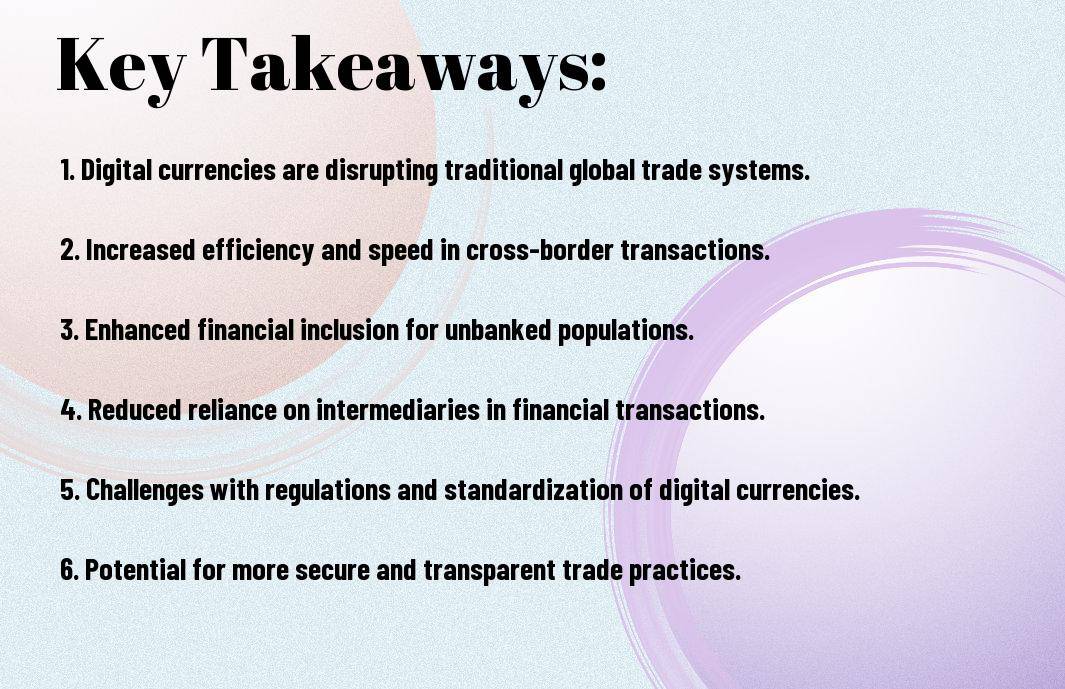
Newsletter Subscribe
Enter your email address below and subscribe to our newsletter

Enter your email address below and subscribe to our newsletter

Impact of digital currencies on global trade cannot be overstated. The rise of cryptocurrencies such as Bitcoin and Ethereum has ushered in a new era of financial transactions that transcends geographical boundaries and traditional banking systems. This shift has the potential to revolutionize the way businesses conduct international trade, offering unprecedented speed, security, and cost-efficiency.

One of the most significant advancements in global trade and finance in recent years has been the rise of digital currencies. These digital assets have transformed the way we perceive traditional forms of money and have the potential to revolutionize the global economy. To fully grasp the impact of digital currencies, it is important to probe into their origin and evolution.
Currencies in digital form have been around longer than most people realize. The concept of digital currencies can be traced back to the 1980s with the advent of electronic money systems. However, it was not until the release of Bitcoin in 2009 by an unknown person using the alias Satoshi Nakamoto that the world saw the birth of the first decentralized cryptocurrency. This groundbreaking innovation laid the foundation for the plethora of digital currencies that exist today.
Currencies in the digital realm encompass a wide variety of forms, each with its unique features and applications. The main types include cryptocurrencies, stablecoins, digital tokens, central bank digital currencies (CBDCs), and non-fungible tokens (NFTs). Perceiving the distinctions between these types is crucial in understanding the diversity and potential of digital currencies.
| Cryptocurrencies | Digital assets secured by cryptography, typically decentralized and operating on blockchain technology. |
| Stablecoins | Digital currencies pegged to stable assets like fiat currencies or commodities to minimize volatility. |
| Digital Tokens | Units of value issued by a decentralized application or platform, representing assets or utility. |
| Central Bank Digital Currencies (CBDCs) | Digital versions of fiat currencies issued and regulated by central banks. |
| Non-Fungible Tokens (NFTs) | Digital assets representing ownership or proof of authenticity of unique items through blockchain technology. |
Digital currencies operate on the principle of cryptography and blockchain technology. These currencies are typically decentralized, meaning they are not controlled by any central authority such as a government or financial institution. Transactions are recorded on a public ledger (blockchain), ensuring transparency and security.
Types of digital currencies are designed with specific use cases in mind. Cryptocurrencies like Bitcoin are primarily used for decentralized peer-to-peer transactions, while stablecoins aim to provide price stability and facilitate seamless transactions in the digital economy. Understanding the mechanisms behind how these digital currencies work is important for individuals and businesses looking to leverage their benefits.
Another critical aspect of digital currencies is ensuring the safety and security of transactions. With the rise of digital transactions, the risk of cyberattacks and fraud has also increased. It is crucial for users to adopt best practices such as using secure wallets, enabling two-factor authentication, and staying alert to potential scams. Educating oneself on the security measures needed to protect digital assets is paramount in the world of online finance.
To put it briefly, the world of digital currencies is vast and dynamic, offering a myriad of opportunities for users worldwide. By understanding the various types, workings, and security aspects of digital currencies, individuals and businesses can navigate this new financial landscape with confidence and security.

On the global trade stage, the emergence of digital currencies, such as Bitcoin and Ethereum, has prompted a significant shift from traditional transaction methods. Gone are the days when international trade relied solely on conventional banking systems and fiat currencies. Digital currencies offer a decentralized and borderless alternative to the traditional financial infrastructure, providing a faster and more cost-effective way to conduct cross-border transactions.
Global trade stands to benefit immensely from the adoption of digital currencies. With digital currencies, transactions can be processed in real-time, reducing the time and costs associated with traditional banking systems. Additionally, the use of digital currencies eliminates the need for currency conversions, thus avoiding exchange rate fluctuations that can impact the bottom line of businesses engaged in international trade.
Advantages: The transparency and immutability of blockchain technology underlying digital currencies provide a secure and trustworthy way to conduct international transactions. Smart contracts, enabled by digital currencies, offer automation and efficiency in trade agreements, reducing the risk of fraud and disputes.
Currencies like Bitcoin and other digital currencies, while offering numerous benefits, also present challenges and risks for global trade. The volatile nature of digital currencies can lead to significant price fluctuations, posing a risk to businesses that rely on stable financial conditions for their operations. Additionally, the regulatory landscape surrounding digital currencies is still evolving, creating uncertainty and compliance challenges for businesses engaged in international trade.
Challenges: Cybersecurity threats, such as hacking and data breaches, are a significant concern in digital currencies and can pose a threat to the integrity of international trade transactions. Moreover, the potential for illicit activities, such as money laundering and terrorism financing, remains a key challenge that regulators and businesses must address to ensure the legitimacy of global trade conducted with digital currencies.
To address the evolving landscape of digital currencies, nations and international bodies are formulating regulatory frameworks. Any national regulatory guidelines aim to prevent money laundering, terrorist financing, and fraud while promoting innovation and protecting consumers. Internationally, organizations like the Financial Action Task Force (FATF) set standards for combating money laundering and countering the financing of terrorism in the digital currency space.
The regulatory environment significantly influences the adoption of digital currencies. The uncertainty and varying approaches among countries can create challenges for businesses and users. Clarity and consistency in regulations can provide confidence, encourage investment, and foster mainstream acceptance of digital currencies.
Digital currencies operate across borders, requiring collaboration among nations to establish cohesive regulatory frameworks. Harmonizing regulations can reduce risks for users and businesses, promote innovation, and facilitate cross-border transactions. Increased regulatory clarity may attract institutional investors and further legitimize the digital currency market.
Regulation of digital currencies is expected to continue evolving as technology advances and adoption grows. Regulators will need to strike a balance between oversight and fostering innovation to harness the benefits of digital currencies. Regulatory actions will likely focus on enhancing consumer protection, ensuring financial stability, and mitigating risks associated with digital currencies.
National authorities will need to collaborate with international counterparts to develop coherent regulatory approaches that accommodate the global nature of digital currencies. Flexibility and adaptability in regulatory frameworks will be crucial to address emerging challenges and opportunities in the digital currency ecosystem.

Many experts believe that blockchain technology is at the forefront of the economic revolution brought about by digital currencies. According to a report by Brookings Institution, blockchain has the potential to reshape the global financial system. The decentralized and secure nature of blockchain technology is revolutionizing the way we think about trust, transparency, and data integrity in various sectors, particularly in global trade.
The blockchain is a decentralized and distributed ledger technology that records transactions across a network of computers. Each block in the chain contains a number of transactions, and every time a new transaction occurs on the blockchain, a record of that transaction is added to every participant’s ledger. This creates a secure and transparent record of transactions that cannot be altered retroactively. The key importance of blockchain lies in its ability to provide a tamper-proof record of data, which enhances security, trust, and efficiency in trade transactions.
Role automation, efficiency, and transparency that smart contracts bring to trade processes are significant. Smart contracts are self-executing contracts with the terms of the agreement between buyer and seller directly written into lines of code. When predefined conditions are met, the contract is automatically executed without the need for intermediaries. These contracts help reduce the likelihood of fraud, decrease transaction costs, and speed up the execution of trade agreements.
Plus, smart contracts in trade can automate various processes such as payments, customs clearance, and compliance checks. This automation reduces human error, streamlines operations, and ensures that both parties comply with agreed-upon terms. As a result, smart contracts play a crucial role in transforming traditional trade mechanisms into more efficient and secure processes.
Blockchain technology is revolutionizing supply chain management by providing a transparent and immutable record of every transaction that occurs within the supply chain. The ability to track and trace products from their origin to the final destination enhances visibility and accountability throughout the supply chain. This transparency helps in identifying and addressing issues such as counterfeiting, theft, and logistical inefficiencies, ultimately leading to cost savings and improved customer trust.
Basics Connecting supply chain participants in a decentralized manner through blockchain technology enables secure and real-time sharing of data, leading to more efficient and trustworthy supply chain management practices.

Despite the advancements in traditional banking, a significant portion of the global population remains unbanked or underbanked. The rise of digital currencies presents a potential solution to this financial inclusion challenge. According to The Currency Revolution, digital currencies have the potential to provide financial services to the unbanked population, offering them access to a range of economic opportunities that were previously out of reach.
Currencies such as cryptocurrency and stablecoins can enable individuals without access to traditional banking systems to participate in global trade and financial transactions. By leveraging digital currencies, the unbanked population can securely store and transfer funds, receive payments, and access credit and investment opportunities. This inclusion not only benefits individuals by granting them financial autonomy but also stimulates economic growth by integrating more people into the formal financial system.
Population The adoption of digital currencies also has a profound impact on small and medium enterprises (SMEs), particularly those operating in developing economies. These businesses often face challenges in accessing financial services from traditional banks, limiting their growth potential. By embracing digital currencies, SMEs can overcome barriers such as high transaction costs, lengthy processing times, and limited access to credit. This shift empowers SMEs to streamline their operations, expand their customer base, and engage in cross-border trade more efficiently.
With the ability to transact directly with partners around the globe in a secure, transparent, and cost-effective manner, SMEs can leverage digital currencies to drive innovation and competitiveness. This newfound accessibility to a broader financial ecosystem opens doors for SMEs to explore new markets, forge strategic partnerships, and scale their businesses sustainably.
On a larger scale, the utilization of digital currencies empowers individuals and businesses by reducing dependency on traditional financial institutions and intermediaries. By embracing decentralized financial solutions, users gain greater control over their funds, lower transaction costs, faster settlement times, and enhanced financial privacy. This empowerment fosters a more inclusive and equitable financial landscape, where individuals and businesses can transact with confidence and autonomy.
Unbanked Leveraging digital currencies not only expands access to financial services but also promotes financial literacy and economic participation among underserved populations. By bridging the gap between the banked and unbanked, digital currencies pave the way for a more interconnected and prosperous global economy.
Now, the rise of digital currencies is significantly impacting the banking and financial services industry worldwide. This technological advancement has the potential to disrupt traditional banking models, as more people are embracing decentralized and borderless financial options. The emergence of blockchain technology and digital currencies has enabled individuals to make direct peer-to-peer transactions without the need for intermediaries like banks.
For financial regulators and central banks, the proliferation of digital currencies presents both challenges and opportunities. With the growing adoption of cryptocurrencies, central banks are exploring the idea of creating their own digital currencies to maintain control over monetary policy and keep pace with the changing financial landscape. The decentralized nature of digital currencies also poses challenges in terms of monitoring and regulating monetary supply, potentially impacting inflation rates and overall economic stability.
Financial authorities are closely monitoring the impact of digital currencies on inflation rates and monetary policy. The ability to quickly transfer value across borders with minimal fees could lead to increased competition with traditional banking systems, potentially affecting the effectiveness of monetary policy tools in controlling inflation. Regulators are exploring ways to strike a balance between embracing innovation and protecting the stability of financial systems.
Financial institutions and businesses are beginning to recognize the potential of digital currencies to revolutionize the future of work. The implementation of blockchain technology and digital payment systems can streamline payroll processes, reduce transaction costs, and increase financial inclusion for workers around the globe. Employers can leverage digital currencies to facilitate seamless cross-border payments and provide more efficient financial services to their employees.
A shift towards digital currencies in the workplace could lead to more accessible financial services for individuals who are underserved by traditional banking systems. While this transformation holds promise for enhancing financial inclusion and efficiency, it also raises concerns about data privacy, security, and the displacement of traditional banking roles in the future job market.
Upon reflecting on the significant impact of digital currencies on global trade, it is clear that we are witnessing an economic revolution that is reshaping the way businesses and individuals engage in financial transactions. The decentralized nature of digital currencies, such as Bitcoin and Ethereum, has the potential to eliminate barriers to trade, reduce transaction costs, and increase efficiency in cross-border transactions.
As digital currencies continue to gain wider acceptance and adoption, it is crucial for governments, businesses, and individuals to adapt to this new financial landscape. Embracing the opportunities presented by digital currencies can lead to increased financial inclusion, enhanced security, and greater efficiency in global trade. By staying informed and proactive in integrating digital currencies into existing financial systems, we can harness the full potential of this economic revolution and drive innovation in the way we conduct international transactions.
A: The Economic Revolution refers to the significant changes and shifts in the global economic system, particularly driven by technological advancements, such as digital currencies.
A: Digital currencies are virtual or electronic currencies that utilize cryptography for security and operate independently of a central authority, such as Bitcoin or Ethereum.
A: Digital currencies have the potential to streamline international transactions, reduce fees, eliminate currency exchange costs, and facilitate faster cross-border payments, thus revolutionizing global trade.
A: Some benefits of digital currencies in global trade include increased efficiency, enhanced security, greater transparency, reduced fraud risk, and improved financial inclusion for individuals and businesses worldwide.
A: Yes, challenges include regulatory uncertainties, potential for illegal activities, technological risks such as hacking, scalability issues, and concerns about market volatility and price fluctuations.
A: Governments are exploring ways to regulate digital currencies to ensure consumer protection, prevent money laundering and fraud, promote financial stability, and harness the benefits of blockchain technology for economic growth.
A: The future of digital currencies in global trade is promising, with ongoing innovations in blockchain technology, increased mainstream adoption of cryptocurrencies, and potential transformative effects on traditional financial systems and international commerce.